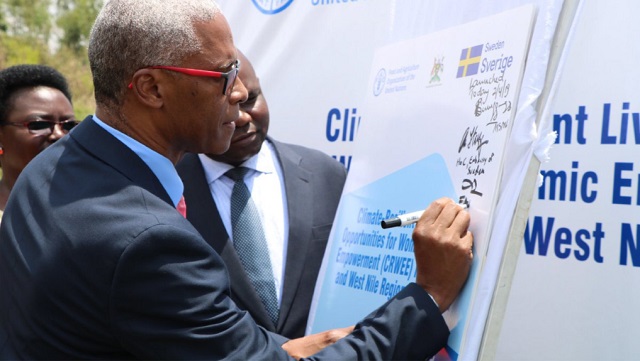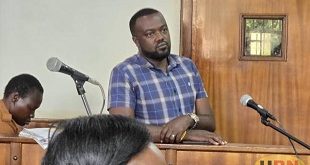
The challenge is that only two sub counties will be selected in the selected districts
Kampala, Uganda | ISAAC KHISA | Like in most communities in Uganda, rural women in West Nile and Karamoja regions have limited access to resources to cater for their families.
They have to search for food, school fees for their children as a section of their husbands saunter aimlessly in their villages.
“More than 80% of women in Yumbe District now bear most of the burdens in their homes,” Alia Kadala from the Uganda Muslim Supreme Council- Yumbe told The Independent in an interview.
“A section of husbands have gone to as far as resorting to leaving home early to go to the market to simply ‘pass time’ and only return home late in the night, sometimes pretending to be having stomach ache, so that their wives do not ask them for food.”
Kadala is not happy with this situation.
“I always prayed that something happens in our communities so that we all participate in various economic activities and that none is burdened,” she added.
Indeed, part of Kadala’s dreams seem to have come true on April 02 as the Food and Agriculture Organization of the United Nations in partnership with the Swedish Embassy in Uganda and the government launched a US$9million project dubbed ‘Climate-Resilient Livelihood Opportunities for Women Economic Empowerment (CRWEE) at Muni University in Arua.
The project will also benefit youths aged 18-30 including women living with disabilities, and people living with HIV and AIDS as well as school dropouts of working cohort of 14-17 years.
The five-year project is to be implemented in eight districts of West Nile that include; Nebbi, Zombo, Arua, Maracha, Koboko, Yumbe, Moyo and Adjuman and four districts in Karamoja sub-region that include Abim, Napak, Moroto and Nakapiripirit.
Kennedy Igbokwe, the project manager for Climate Resilience at FAO said the intervention aims to increase production and income while attempting to ease burden to the already over-burdened women.
He said the project has three result areas that include; improved women’s access to and control of productive resources, improvement of household incomes and climate resilience livelihood as well as promote bioenergy plantations, biogas models and energy saving technologies to enhance climate adaption.
“The project will be implemented in such a way that once an individual has been selected, they will be trained and given seed capital to start and grow their ventures,” he told The Independent in an interview.
“Prospective beneficiaries who, for instance, want to venture into poultry or cattle, will be trained and given birds or heads of cattle.”
He revealed that with the help of the district officials, two sub counties in every selected districts have been selected based on the poverty levels and refugee influx.
Data from the Uganda Bureau of Statistics (UBOS) shows that all the sub-counties with the highest poverty rates—ranging from 65% to 95% — are located in Karamoja. Poverty rates are also extremely high in the West Nile sub-regions.
More than 52,500 direct beneficiaries organized in 250 Farmer Field Schools will be selected in a group of ten, of which, six will have to be women, Igbokwe said.
He added that FAO will also enter into partnership with relevant government departments, research institutes, universities, civil society organisations and private sector in the implementation of the project.
This development comes as the food agency also plans to invest US$9million in up scaling valley tank technologies in the cattle corridor starting from Nakasongola to Karamoja in the next five years.
Antonio Querido, the FAO representative for Uganda said the links between climate change and sustainable developments are undeniable and that poor countries will be among those most affected and least able to cope with the anticipated shocks to their social, economic and natural systems.
“However, climate change can be tackled by addressing the root causes of poverty and inequality…,” he said.
He said although Uganda has 20% of the land covered with water resources, there are still investments in hydrological infrastructure to capture and deliver water where it is needed for domestic and production purposes.
Statistics from the Ministry of Waster and Environment shows that the country’s population still depends on rainfall for agriculture and water for domestic, use with only 0.2% of the estimated 8.85million hectares of farm land being under irrigation.
Querido said FAO’s invention in West Nile and Karamoja regions in commercial forestry, refugee response, agricultural water for production, livestock health and disease support and management of Fall Armyworm, among others will complement and enhance the impact of this new project.
Ola Hallgren, the head of cooperation at the Swedish Embassy in Kampala said Sweden prioritises five perspectives in development cooperation: The perspective of poor people, rights, environment and climate, gender and conflict perspectives.
He said the Swedish government is committed to support Uganda to increase economic empowerment of rural women through support to production, productivity and productive employment in the agricultural sector, particularly in West Nile and Karamoja regions.
“The government of Sweden recognises the need to address a number of bottlenecks such as the use of rudimentary tools and technology in production, impacts of climate change and environmental degradation, lack of markets and market information, limited access and ownership of production assets for women and youths, limitations to financial access and vulnerabilities to shocks,” he said.
State Minister for Northern Uganda and Woman MP for Zombo District, Grace Kwiyucwiny, said the emphasis now needs to be on production, employment and income to improve status of our livelihood.
Cultural leaders from the region, including Stephen Drani of the Madi community and Phillip Ubim of Alur Kingdom pledged to mobilise communities and leaders to support women in accessing resources for development.
****
 The Independent Uganda: You get the Truth we Pay the Price
The Independent Uganda: You get the Truth we Pay the Price



